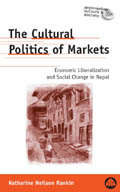 Research Research
Interests
My research spans the ‘economic' and ‘socio-cultural'
sub-disciplines of Geography and Planning, especially as they have been
contoured by the contributions of feminist and post-colonial studies.
I focus primarily on the recent shift in the practice of planning and
international development from state-led to market-led approaches, with
emphasis on attendant processes of social change in South
and Southeast Asia, as well as Canada and the US .
With the resurrection of classical liberalism since the 1980s, markets
have emerged once again as the dominant mechanism for achieving not
only economic growth and efficiency, but also poverty alleviation, political
democracy and social justice. In the devolution from state to market,
we find a remarkable convergence of the dominant neoliberal orthodoxy
with recent feminist and post-modern strains of development and planning
theory. Each of these traditions turns to civil society—said to be endowed
with stocks of social capital that foster community ties and local self-reliance—as
the preferred site and engine for development.
The primary objective in my research and publishing has been to critically
evaluate these trends as follows: [a] by assessing the epistemological
foundations of the shift to market-led development; [b] by examining
the macro-regulatory frameworks for the restructuring of state-society relations,
with an emphasis on the distinctiveness of national paths to adjustment;
[c] by investigating the institutional forms emerging within civil society
to pursue market-led development strategies; and [d] by exploring how
these policies and processes articulate with cultural processes in particular
South and Southeast Asian and North American contexts.
As a geographer, that is, I am interested in tracking the multi-scalar
aspects of economic liberalization—the macro-regulatory frameworks,
institutional configurations and cultural articulations. As a planner,
I am interested in developing a normative dimension to my research—focusing
specifically on alternative economic spaces, the activist state, and
the challenge of extending political democracy to the sphere of the
economy. Programs
- The Cultural Politics of Markets: Economic Liberalization
and Social Change in Nepal . This project examines how
economic liberalization articulates with local social structures
and cultures of value through an ethnographic study of the social
embeddedness of markets in Nepal . The study blends the ethnographic
approach of Anthropology with the comparative thrust of Geography
to develop a normative theory of planning and development. This
study was funded by a Fulbright Research Grant
- The Gender Politics of Development Institutions: A
Comparative Case Study of Microfinance in Nepal and Vietnam . This research investigates the institutional context for implementing
gender policy at three spatial scales in the development process:
supranational and national agencies setting the macro-regulatory
context, the organizations implementing development projects,
and the beneficiary groups through which organizations distribute
their services. The emphasis here is on the politics of market formation, and the implication of 'official' and 'ordinary' gender ideologies in these processes. The study is funded by the Social Sciences and
Humanities Research Council (SSHRC) of Canada and a Connaught
New Staff Matching Grant. It has been carried out in collaboration
with Dr. Yogendra Shakya.
- The Politics of Urban Planning in Nepal .
Owing in part to ideologies of participation and civil society
emanating from donor agencies and in part to the practical inefficacies
of a stalled political democracy, municipal governance in Nepal
is increasingly being devolved to the neighborhood scale. This research
examines the role of urban neighborhood associations in the provision
of municipal services, especially material infrastructures such
as sewage, drinking water and roads, and the questions raised
by this phenomenon about the distribution of urban services. The
study is funded by a SSHRC SIG grant and is being carried out
in collaboration with doctoral candidate Sabin Ninglekhu.
- Commercial Change in Toronto 's Downtown West Neighborhoods.
The objective here is to document patterns of commercial change
as part of a wider initiative, involving the U of T Centre for
Urban and Community Studies (CUCS) and the social service agency,
St. Christopher House, to consider strategies for maintaining
the income and ethnic diversity of Toronto 's vibrant, but rapidly
gentrifying downtown neighborhoods. The study concentrates particularly
on the perspectives and needs of long-time, independent businesses,
and is funded as a pilot study under the auspices of a SSHRC CURA
grant awarded to CUCS and St. Christopher House
|
 Publications Publications
Books
Rankin, K. N. 2004. The
Cultural Politics of Markets: Economic Liberalization and Social Change
in Nepal. Pluto Press and University of Toronto Press.
 Order
form (PDF) Order
form (PDF)
(larger)
Works-in-Progress
Rankin, K.N., “Manufacturing Rural Finance in Asia : The Politics of Development Institutions," submitted to Geoforum 12 July 2007, 11,000 words.
Rankin, K.N., "Social and Cultural Geography: Cultural Globalization," invited entry to the International Encyclopedia of Human Geography, submitted July 2007, 9,000 words.
Ninglekhu, Sabin and K. N. Rankin, “Neighborhood Associations as Civic Space in Kathmandu: Progressive and Regressive Possibilities,” invited book chapter submitted to Globalization, Civic Spaces and Governance: Community and Public Life in Urban Asia (ed., Amrita Daniere and Michael Douglass); under contract with Routledge. Submitted August 2005, 9,000 words.
Recent Journal Ariticles
Shakya, Yogendra B. and K.N. Rankin. Forthcoming (2008). “The Politics of Subversion in Development Practice: Microfinance in Nepal and Vietnam,” Journal of Development Studies.
Goonewardena, K. and K. N. Rankin. 2004. “The Desire Called Civil
Society: A Contribution to the Critique of a Bourgeois Category,” Planning Theory 3(2): 117-149.
Goonewardena, K, K. N. Rankin and Sarah Weinstock. 2004. “Diversity
and Planning Education: A Canadian Perspective,” Canadian Planning
and Policy 13:1 Supplement 2004: 1-27.
Rankin, K.N. 2003. "Anthropologies and Geographies of Globalization,"
Progress in Human Geography 27(6) : 708-734.
Rankin, K.N. 2003. "Cultures of Economies: Gender and Socio-Spatial
Change in Nepal," Gender, Place and Culture 10(2): 111-129.
Rankin, K.N. 2002. "Social Capital, Microfinance, and the Politics
of Development," Journal of Feminist Economics 8(1): 1-24.
Mayer, Margit and K.N.Rankin. 2002."Social Capital and (Community)
Development: a North/South perspective," Antipode 34(4).
Rankin, K.N. 2001. "Governing Development: Neoliberalism, Microcredit,
and Rational Economic Woman," Economy and Society 30(1): 18-37.Abstract:
Economy and Society
Rankin, K.N. 2001. "Planning and the Politics of Social Needs: Lessons
from Financial Market Regulation in Nepal," International Planning
Studies (1), 2001: 89-102. Abstract: International Planning Studies
Book Chapters
Rankin, K.N. and Yogendra Shakya, 2007, “Neoliberalising the
Grassroots: Microfinance and the Politics of Development in Nepal,” pp. 48-76.
In Kim England and Kevin Ward (eds.), Neo-liberalization: Networks, States,
Peoples. Oxford : Blackwell
Rankin, K. N. 2003 . “Neoliberalism and Newar Economics
of Practice: Gender and the Politics of Consciousness in a Nepalese Merchant
Community,” pp. 127-146. In Gracia Clark (ed.), Gender and Economic
Life, in the series Monographs in Economic Anthropology . Walnut Creek
, CA : Altamira Press.
Rankin, K. N. and Kanishka Goonewardena. 2003. “The Political
Economy of Ethnic Conflict in Asia : Democracy Beyond Democracy,”
pp. 95-116. In Susan Henders (ed.), Identity and Ethnic Conflict in Asia . Boulder , CO : Rowman and Littlefield. First author.
Rankin, K. 1999. "The Predicament of Labor: Kamaiya Practices and
the Ideology of Freedom," in H. Skar, ed., Nepal: Tharu and Tarai
Neighbors, Biblioteca Himalayica Series III, Volume 16, ed. H.K. Kuloy.
Kathmandu: Biblioteca Himalayica, pp. 27-45.
Book Reviews
Rankin, K. 2007. Review of The Anthropology of Development and Globalization (edited by Marc Edelman and Angelique Haugerud), Progress in Human Geography.
Rankin, K. 2005. Review of High Frontiers: Dolpo and the Changing World
of Himalayan Pastoralists (by Kenneth M. Bauer), Journal of the Royal
Anthropological Institute (formerly Man), June, 384-385.
Rankin, K. 2005. Review of The Anthropology of Space and Place: Locating
Culture (edited by Setha Lowe and Denise Lawrence-Zúñiga),
Progress in Human Geography , 29(1): 107-108.
Rankin, K. 2004. Review of Gender, Development and Globalization (by
Lourdes Benería), Journal of the American Planning Association
70(4): 493-4
|
